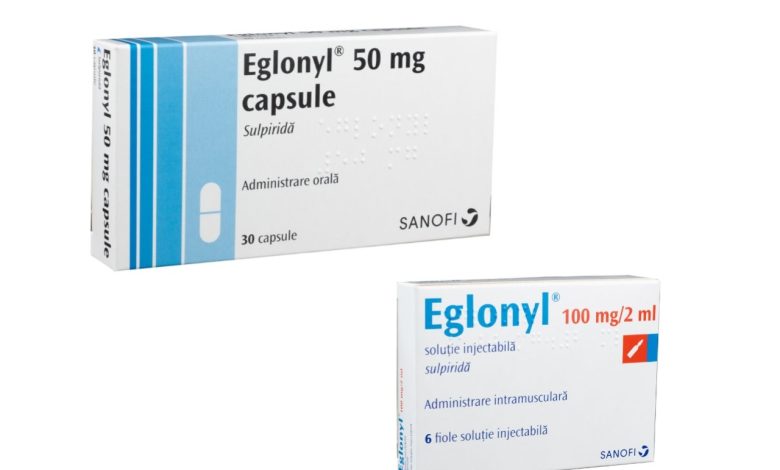Eglonyl: Uses, Dosage, Side Effects, Interactions

Eglonyl is a brand name for a medication called Sulpiride. It is an atypical antipsychotic medication that is used to treat various psychiatric conditions. Eglonyl is used for the management of the following conditions:
1. Antipsychotic: Eglonyl (Sulpiride) is primarily prescribed to treat psychiatric conditions such as schizophrenia and other psychotic disorders. It helps alleviate symptoms like hallucinations, delusions, and thought disturbances.
2. Mood Disorders: In some cases, Sulpiride may also be used off-label to manage symptoms of mood disorders, such as bipolar disorder and major depressive disorder, particularly when conventional antidepressants have been ineffective. Eglonyl is also used for short-term treatment of anxiety symptoms in adult patients.
3. Gastrointestinal Disorders: In some countries, Sulpiride is also used off-label for the treatment of certain gastrointestinal conditions, such as irritable bowel syndrome (IBS) and functional dyspepsia, due to its prokinetic properties that can improve gastric motility.
Dosage
The dosage of Eglonyl can vary depending on the specific condition being treated, the patient’s age, and individual response to the medication. It’s crucial to follow your healthcare provider’s recommendations or the instructions provided on the medication label. The following dosage guidelines are general references, and your healthcare provider will determine the most appropriate dose for your specific situation:
For Schizophrenia and Psychotic Disorders:
• Adults: The typical starting dose for adults with schizophrenia or other psychotic disorders is around 200 to 400 milligrams (mg) per day, divided into two or three doses. Your healthcare provider may adjust the dose based on your response to the medication. Some individuals may require higher doses.
• Elderly: In older adults, lower initial doses (e.g., 50 to 200 mg per day) are often recommended due to increased sensitivity to the medication.
For Mood Disorders (Off-label Use):
• Bipolar Disorder: The dosage for bipolar disorder may vary widely and is typically determined by a psychiatrist. It may range from 50 mg to 600 mg per day, depending on the phase of the disorder and individual response.
• Major Depressive Disorder (Adjunctive Treatment): Sulpiride may be used as an adjunct to other antidepressant medications. The dosage can range from 50 mg to 200 mg per day.
For Gastrointestinal Disorders (Off-label Use):
• Functional Dyspepsia or Irritable Bowel Syndrome: In some countries, Sulpiride is used to treat gastrointestinal disorders. The dosage can vary, but it is typically lower than that used for psychiatric conditions.
It’s important to start at a lower dose and gradually increase it under the supervision of a healthcare provider to minimize side effects. Your healthcare provider will monitor your progress and adjust your treatment plan as needed.
It’s crucial not to self-adjust your dosage or stop taking Eglonyl without consulting your healthcare provider, even if you start to feel better. Abruptly discontinuing the medication can lead to withdrawal symptoms or a relapse of the underlying condition.
Eglonyl Side effects
Eglonyl can cause side effects, some of which can be mild, while others may be more severe. It’s essential to be aware of these potential side effects and to consult your healthcare provider if you experience any unusual or severe symptoms. Here are some common side effects associated with Eglonyl (Sulpiride):
Common Side Effects:
1. Extrapyramidal Symptoms (EPS): These are movement-related side effects and can include symptoms such as muscle stiffness, tremors, restlessness, and abnormal body movements. These effects are more common at higher doses and may be managed with dose adjustments or additional medications.
2. Sedation: Drowsiness or sedation is a common side effect, especially when starting the medication. This effect may improve over time as your body adjusts to the drug.
3. Gastrointestinal Disturbances: Some individuals may experience gastrointestinal symptoms such as nausea, vomiting, or constipation.
4. Weight Gain: Weight gain can occur with prolonged use of Sulpiride.
5. Hormonal Changes: In rare cases, Eglonyl can lead to hormonal changes, including elevated levels of prolactin. This hormonal change can cause breast enlargement, milk production (even in men), or menstrual irregularities.
Less Common Side Effects:
6. Neuroleptic Malignant Syndrome (NMS): Although rare, NMS is a severe and potentially life-threatening condition associated with antipsychotic medications. Symptoms may include high fever, muscle rigidity, altered mental status, and autonomic dysfunction. Seek immediate medical attention if these symptoms occur.
7. Allergic Reactions: Like all medications, Sulpiride can rarely cause allergic reactions, including rash, itching, swelling, or difficulty breathing.
8. Liver Function: In some cases, Sulpiride can affect liver function, which may be indicated by symptoms like jaundice (yellowing of the skin or eyes), dark urine, or persistent nausea.
9. Cardiovascular Effects: Sulpiride can rarely cause changes in heart rate or blood pressure.
10. Metabolic Effects: There have been reports of metabolic effects such as changes in blood sugar levels and lipid profiles.
11. Skin Reactions: Skin reactions, such as rash or photosensitivity, are rare but possible.
It’s essential to report any unusual or severe side effects to your healthcare provider promptly. Eglonyl should only be used under the supervision of a qualified healthcare professional, and treatment should be tailored to the individual’s specific needs and condition. Your healthcare provider will monitor your progress and adjust your treatment plan as necessary to manage side effects and achieve the best therapeutic outcome.
Eglonyl Interactions
Eglonyl can interact with various medications and substances. These interactions can affect the effectiveness of Eglonyl or increase the risk of side effects. It’s important to inform your healthcare provider about all the medications, supplements, and herbs you are taking to ensure safe and effective use of Eglonyl. Here are some common interactions to be aware of:
1. Other Antipsychotic Medications: Combining Eglonyl with other antipsychotic medications can increase the risk of side effects, including extrapyramidal symptoms (EPS) and sedation. It’s generally advisable to avoid using multiple antipsychotics simultaneously unless specifically instructed by a healthcare provider.
2. Central Nervous System (CNS) Depressants: Eglonyl can enhance the sedative effects of medications that depress the central nervous system, such as alcohol, benzodiazepines (e.g., diazepam), and opioids (e.g., codeine). Combining Eglonyl with these substances can lead to increased drowsiness and impairment of mental and motor skills.
3. Medications That Affect Heart Rhythm: Some medications, such as certain antiarrhythmics, can interact with Eglonyl and increase the risk of irregular heart rhythms. It’s important to inform your healthcare provider if you are taking any heart rhythm medications.
4. Antidepressants: Combining Eglonyl with certain antidepressants, particularly selective serotonin reuptake inhibitors (SSRIs) like fluoxetine or paroxetine, can increase the risk of serotonin syndrome, a potentially serious condition characterized by symptoms like confusion, agitation, rapid heartbeat, and high blood pressure.
5. Medications That Increase Prolactin Levels: Eglonyl can raise levels of the hormone prolactin. Combining it with medications that also increase prolactin levels, such as some antipsychotics and antidepressants, can lead to further elevations and may cause symptoms like breast enlargement, milk production, or menstrual irregularities.
6. Blood Pressure Medications: Eglonyl may affect blood pressure. Combining it with medications used to treat high blood pressure may require adjustments to the doses of these medications.
7. Levodopa (Used for Parkinson’s Disease): Eglonyl may reduce the effectiveness of levodopa, a medication used to manage symptoms of Parkinson’s disease.
8. Lithium: Eglonyl may increase the levels of lithium in the blood, potentially leading to lithium toxicity. If you are on lithium therapy, your lithium levels should be closely monitored.
9. Herbal Supplements: Some herbal supplements, such as St. John’s wort, can interact with Eglonyl and affect its effectiveness or increase the risk of side effects.
10. Grapefruit Juice: Grapefruit juice can inhibit the metabolism of certain medications, potentially increasing the blood levels of Eglonyl and the risk of side effects. It’s advisable to avoid large amounts of grapefruit juice while taking Eglonyl.
Always consult your healthcare provider or pharmacist before starting or stopping any medication, and inform them of your complete medication history to ensure safe and effective use of Eglonyl. Your healthcare provider can provide personalized guidance on how to manage these interactions and adjust your treatment plan as necessary.





